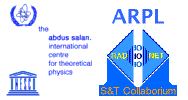
SCHOOL ON RADIO USE FOR
DIGITAL AND MULTIMEDIA COMMUNICATIONS
11th
February - 1st March
2002
, Trieste
(Italy)
-
|
|
|
|
|
|
|
|
 |
|
SCHOOL ON RADIO USE FOR DIGITAL AND MULTIMEDIA COMMUNICATIONS
|
|
|||
|
- |
|
|
|
|
|
|
Date: Thu, 21 Feb 2002 9TH DAY DIARY Of School on Radio use for digital and multimedia communication 21 February 2002 With a nice morning, and beautiful but cloudy weather, we started our 9th day in the use of Radio in digital and multimedia communication school. Mr. M. Fitton (Toshiba, Bristol) presented the first lecture on Principles of Digital Modulation. His whole lecture was very interesting and informative. He expressed it in an excellent manner with fluent English. At 10:30 a.m., he gave a 15 minutes break to relax the participants. At 10:45 he again started his lecture and also explained his second topic "Mobile and Personal Communications". His graphical and colorful slides were very informative and I really came to know about the exact difference of CDMA, FDMA and TDMA. I also found Mr. M. Fitton a very punctual man because he finished his lecture right at 12 O'clock. After that, we took our lunch break, and also took tea in a bar which was fined to our friend Anwar Ali Sanjrani due to his absence in lunch and for wasting our time for his wait. The afternoon session starts with Participants Case Study Presentation. Mr. Abakir T.Tchekirov (Bishkek, Kyrgystan) presented the first case study on "Information Technologies in Kyrgyz Republic". He described the Network Infrastructure existing presently in his country with respect to the geographical locations and spread, and types of technology used. Carlos Avendano (Medillin, Colombia) made the Second presentation. Highlights of his presentation were the Satellite station, Radio Link and private WAN networks. Coming up next was Ngatched Telex from Durban, SouthAfrica. He delivered a paper describing the Stopping Criteria for Turbo Decoding and Turbo Codes for Burst Channels. He was quick to point out the role of Turbo Codes because he had only 15 minutes to explain which was not enough for him but the idea was very nice and all the participants including Mr. M. Fitton (Toshiba) appreciated him. O.S.Adewale (Akure, Nigeria) made the fourth presentation on "Causes and Cure of Latency in the Internet Telephony". He said that Internet telephony is a transport of Telephone calls over the Internet, no matter whether traditional telephony devices, multimedia personal computers or dedicated terminals part in the calls and no matter whether the calls are entirely or only partially transmitted over the Internet. Coming up next were Kundukulam and Karuvandy (India). They delivered their presentation on a Compact Dual Frequency Microstrip Antenna. The presentation was on a very nice, new and efficient idea on the design and development aspects of a microstrip antenna. This antenna can transmit or receive two frequency bands, which are of orthogonal polarization. Their coordination was also very nice because the slides were moving according to their presentation. After a short break, Gbenga-Ilori, A.O. (Department of Electrical and Electronic Engineering Akure, Nigeria) delivered her presentation titled "Technical Aspects in Channel Planning for Digital Terrestrial Television Broadcasting". She described the Evolution of Digital Broadcasting, Channel Planning Methodology, Types of Interference, protection Ratio Parameters and some statistics about channels in her country. After this presentation, Prof. Radicella announced a break for 8:00-10:00 a.m. for the next day (Friday 22nd Feb. 2002) on the greatest Holly Event of Muslims (Eid-ul-Azha), for praying Namaz-Eid. All the participants of the school appreciated the decision of Prof. Radicella and congratulated the Muslim community for this great day. The next presentation was by M.O.Sokunbi (lle-lfe, Nigeria). He presented his case study on "The Socio-economic Impact of Information Technology on the Obafemi Awolowo University Campus". He strongly recommended the use of information technology for the fast development in his country. After that Jean A.Agoua (UAB Cotonou, Benin), presented his survey on Distributed Computing Networks-Networks of Workstation. His presentation includes, aim and composition of Distributed Computing Networks, challenges and opportunities for network of workstations and a case study about the database on climate changing in Benin. Last but not the least was an interesting presentation by Sunil Vasant Rao (India), on the Improvement of Railway System. The thought provoking, interesting sessions finally ended at 6.00 p.m. All the sessions and presentations were held in a very friendly and interactive manner. They were very informative, educative and stimulating to set up inquisitive and learning atmosphere in the school. Kashif Sattar, Department of Computer Science, University of Agriculture, Faisalabad, Pakistan. E-Mail: kashifsattar@hotmail.com
|
Page updated at 22th February 2002, © 2002 ICTP-ARPL, HTML by cfonda
|